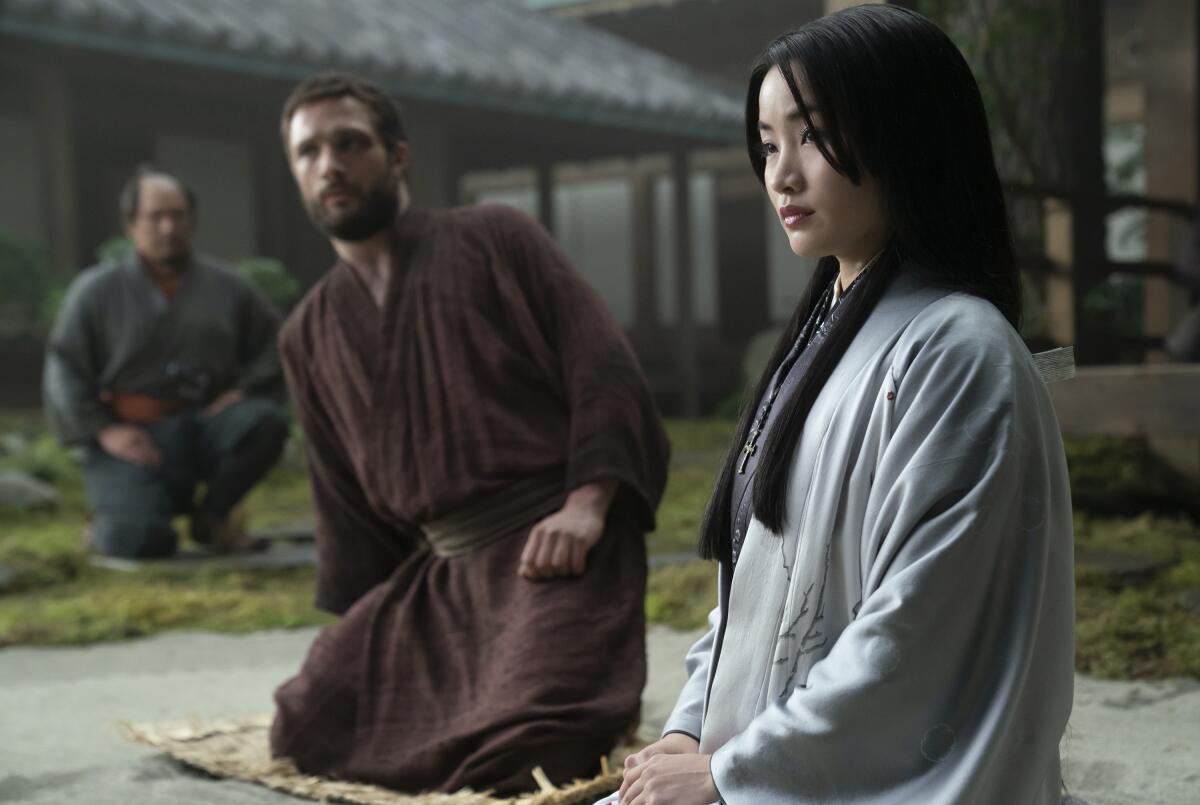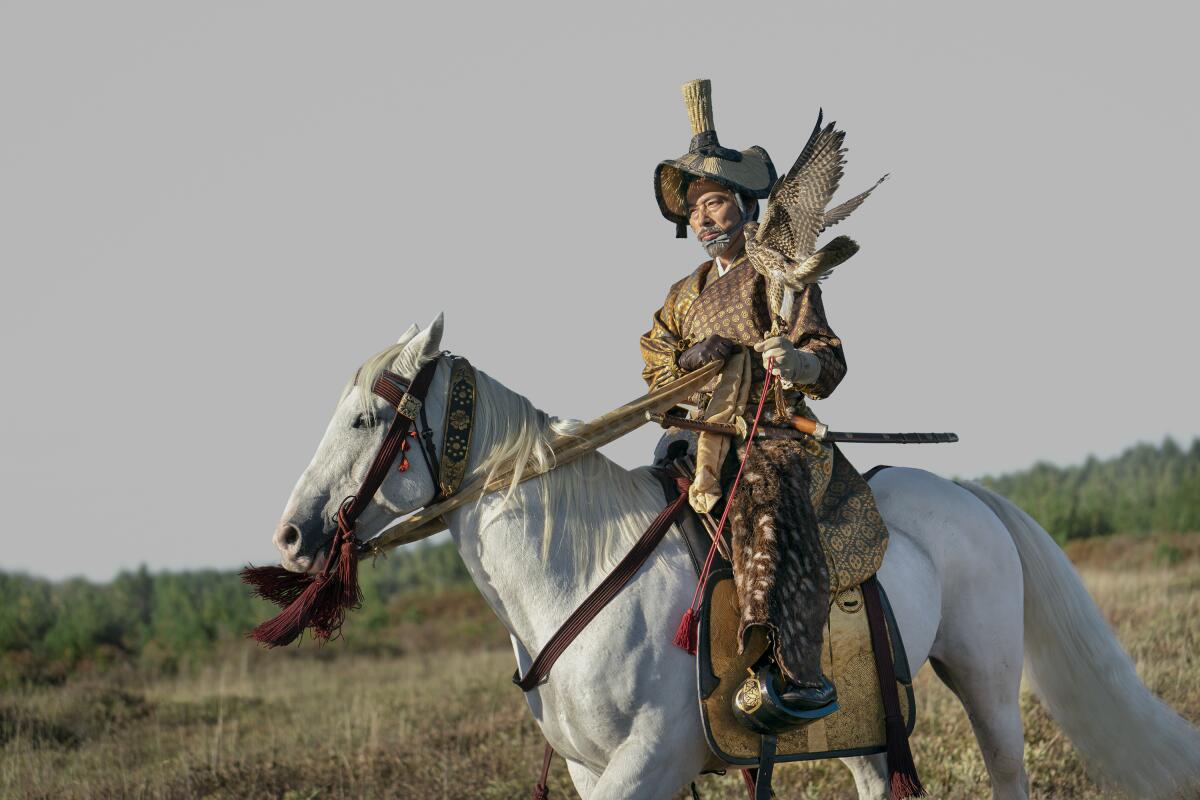Review: ‘Shogun’ is an epic remake that focuses on feudal Japanese politics over romantic drama

- Share via
“Shōgun,” James Clavell‘s big novel of lordly machinations in feudal Japan, has for the second time become a big miniseries, premiering Tuesday on FX and Hulu. Every review you read of this series will compare it to “Game of Thrones,” and I will not refrain from stating the obvious. Indeed, I imagine it was an essential part of the pitch that sold the show.
Set in 1600 on the cusp of the Sengoku and Edo periods, Clavell’s story involves renamed historical characters enacting not necessarily historical events. Its three main figures are the shipwrecked John Blackthorne (Cosmo Jarvis), based on navigator William Adams, the first Englishman to reach Japan, who would become a samurai; Yoshii Toranaga (Hiroyuki Sanada), standing in for Tokugawa Ieyasu, a great lord, president of the council of regents serving to rule Japan until the heir comes of age; and Toda Mariko (Anna Sawai), modeled on Hosokawa Gracia, a Catholic convert from a disgraced family line, enlisted in Clavell’s telling to translate between the two men.
Anna Sawai says she connected deeply with Lady Toda Mariko, her character in FX’s ‘Shogun,’ and that she was encouraged by the creators’ desire to avoid stereotypes of Japanese women.
There’s a lot of plot and subplot, and many secondary and tertiary characters to execute it. The primary conflicts are between Blackthorne, an English Protestant, and the well-entrenched Portuguese Catholic clergy who, protecting their missionary and mercantile interests, would like to see him dead; Blackthorne and Japan itself, a place he doesn’t want to be and doesn’t understand, just as the Japanese, who call him “the barbarian,” don’t understand him; and Toranaga and Ishido Kazunari (Takehiro Hira), a rival lord, who wants to eliminate Toranaga and bend the regents, not an impressive bunch in any case, to his will.
The friendlier relationships, which are also full of conflict, are between Blackthorne and Toranaga, into whose possession he comes; Toranaga and Mariko, whom he appoints as Blackthorne’s in-house translator and upon whom he relies for straight talk; and Mariko and Blackthorne, who work up something of a romance, though she is married to the samurai Toda Hirokatsu, or Buntaro (Shinnosuke Abe) to those close to him, a jealous guy.

That said, not all of these relationships, or the many others that fill the 10-hour series, come to life on the screen. There are some touching scenes, most between characters who have known each other a long time, but one tends to focus on individuals concerned with their own fate rather than how they relate to each other — it’s a lonely crowd — and on the performers and their particular charisma, of which there is no lack.
Though he can seem cruel and arbitrary — certainly by 21st century Western standards — it’s impossible not to identify Toranaga as the good guy in this scrimmage, if only for the air of gravity and nobility that Sanada projects (and because Hira emanates bad guy vibes from the get-go). As Mariko, Sawai, recently seen in “Monarch: Legacy of Monsters,” is the picture of melancholic resolve, and the filmmakers contrive to highlight her otherworldly beauty, filling the screen with her face at every opportunity. They’re reason enough to watch.
Jarvis, who sounds as if he studied Richard Burton to shape his delivery, is perfectly fine and carries off several scenes of heroic derring-do; yet for a central character, he is somewhat beside the point, not just in this historical moment but also in the lives of those closest to Blackthorne; this is less a romance than a political drama. That he doesn’t have any special chemistry with Sawai seems almost as much a matter of concept as casting.
There is a pall of sadness hanging over many characters. They trade fatalistic philosophical aphorisms and moody poetry; some kill themselves or threaten to kill themselves or are told to kill themselves or would like to kill themselves out of what we would consider a poor cause for shame. (It is a conceptual hump a viewer needs to get over.) Providing some relief from the gloom are Tadanobu Asano as Kashigi Yabushige, a scheming lesser lord who boils a man to death out of interest but who, thanks to Asano’s bright performance, is one of the series’ most appealing characters; the Spanish captain Vasco Rodrigues (Néstor Carbonell), who will school Blackthorne in the concept of karma; and Gin (Yuko Miyamoto), a madam who dreams of creating a great red light district in Edo, where Toranaga is building his capitol.
It’s a sumptuous thing, a grand production that makes the 1980s miniseries, which starred Richard Chamberlain, Yoko Shimada and Toshiro Mifune, look like … a 1980s miniseries. (It was a huge success in its time, note.) We get an earthquake, a typhoon, digital armies marching on digital cities, elaborate suits of armor, beautifully constructed village streets and palace quarters. Although one might expect some big battle scenes, the story takes place at a moment of relative peace, if much scheming and skulduggery, and violent action tends to happen in contained spaces and involve comparatively few combatants at a time.
Indeed, Toranaga — who claims he doesn’t want to be shōgun, the absolute authority in the nation, regarding the title as “a brutal relic from a bygone era” — is trying to avoid war yet still get his way. History will have other plans, but they fall outside the scope of this series. If you come here expecting the Battle of Sekigahara, you’ll be disappointed. But subtlety and cleverness can be exciting too.
More to Read
The complete guide to home viewing
Get Screen Gab for everything about the TV shows and streaming movies everyone’s talking about.
You may occasionally receive promotional content from the Los Angeles Times.








